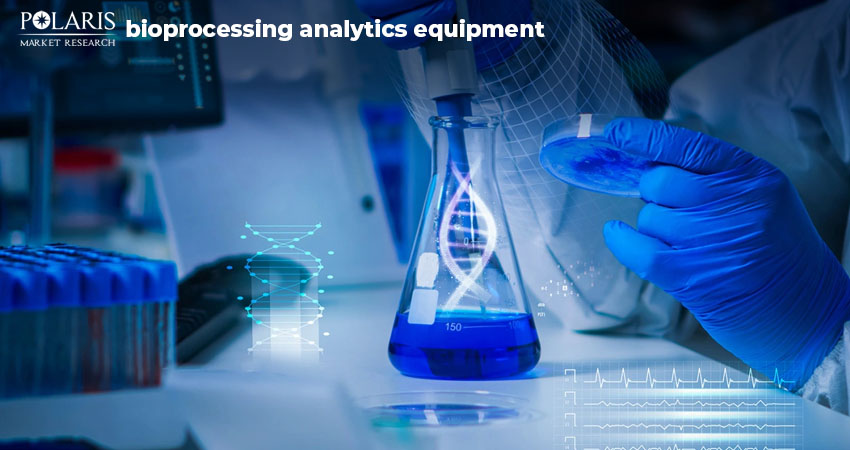Journey of Bioprocessing Analytics Equipment from Lab to Market

Do you ever think of a future where the development of life-saving drugs and treatments is accelerated, and the quality of these products is assured? If yes, then here’s the good news for you, this future is being shaped by rapid advancements in the bioprocessing analytics equipment. These equipment have become indispensable to life science and biotechnology, offering tools that refine production, improve quality, and ensure safety in biopharmaceutical manufacturing.
In this blog, we will go through the rise of bioprocessing analytical equipment, key players running the market, and the latest trends that are driving the growth of the market. Continue reading!
What is Bioprocessing Analytical Equipment?
Bioprocessing analytical equipment are tools and technologies that analyze biological materials during the process of production, particularly in the biopharmaceutical and biotechnology industries. These are critical for quality control, ensuring that all materials and products meet rigorous standards. The most common types of bioprocessing analytical equipment include osmometers, metabolite analyzers, and mass spectrometers, each designed specifically for their specific jobs.
As biopharmaceutical companies race in order to bring new therapies to market, they rely on advanced analytical tools to ensure the integrity and efficacy of their products.
Who Makes Bioprocessing Analytic Equipment?
Thermo Fisher Scientific: Thermo Fisher Scientific is a major player in the bioprocessing analytical equipment market, known for its wide range of high-quality instruments, including mass spectrometers, centrifuges, and chromatography systems. The company is well-known for its commitment to innovation and has introduced several products that incorporate AI for predictive analytics and automation.
Sartorius: Sartorius is another prominent name that comes up while talking about this industry. Sartorius offers bioprocessing solutions that include advanced cell analyzers and inline monitoring systems. The company is known for its innovative approaches to single-use technologies, which help companies adopt flexible and sustainable methods of production.
Agilent Technologies: Agilent Technologies stands out as the global leader in life science, diagnostics, and applied chemical markets. Agilent has a comprehensive portfolio of analytical instruments, including chromatography systems, mass spectrometry, and spectroscopy systems.
GE Healthcare Life Sciences (Cytiva): Cytiva, formerly known as GE Healthcare Life Sciences, is a key player in the development of bioprocessing technologies, including filtrations, chromatography, and cell-culture equipment. Their focus on sustainable technologies has set them apart, with products designed to minimize waste and use of energy.
Bio-Rad Laboratories: Bio-Rad Laboratories is a brand that is regarded as one of the best for its bioprocessing analytical tools, including instruments for cell counting, protein quantification, and molecular analysis. Their emphasis on high-quality, reliable equipment has made it a favorite among research institutes and biopharmaceutical companies.
Growing Demand for Bioprocessing Analytical Equipment
The demand for bioprocessing analytical equipment is growing as the biopharmaceuticals and biopharmaceutical logistics market is expanding, with therapeutic areas like gene and cell therapy, monoclonal antibodies, and recombinant protein making the most of it. Such treatments require precise and sophisticated equipment to monitor complex biological processes, and even a slight deviation can have significant consequences. The global bioprocessing analytical equipment market is expected to grow significantly with the help of rising investments in biotechnological industries and increasing research and development activities.
Key Trends Shaping Growth
- Automation and Artificial Intelligence (AI) Integration: Automation and integration of AI are revolutionizing bioprocessing analytical equipment, making it faster, more accurate, and less dependent on human intervention. Automated systems are smooth in sample preparation, reduce errors, and allow you for high throughput screening, which is particularly important in drug discovery and development. AI algorithms also enable predictive analytics, helping researchers make real-time decisions and identify potential issues early in the process.
- Real-Time and In-Line Monitoring: Traditional methods of bioprocessing analysis often require taking samples out of the production line, leading to time delays and potential contaminations. In contrast, real-time and in-line monitoring allows for immediate feedback, resulting in quicker adjustments and enhanced product quality.
- Miniaturization and Portability: Miniaturized analytical devices are gaining popularity, particularly for small and medium-sized enterprises that may not have large laboratory spaces. This trend is now driving demand for compact analyzers that are just as powerful as larger lab-based instruments. Portable equipment allows for on-site testing, reducing the need for extensive lab infrastructure and enabling more flexible steps in production.
- Increasing Use of Single-Use Technologies: Single-use technologies (SUTs) are transforming bioprocessing due to their cost-effectiveness, flexibility, and lower risk for contamination. Unlike traditional equipment made out of stainless steel, SUTs are disposable and reduce the time and resources required for cleaning and validations. Also, they simplify the setup and reduce downtime between production runs.
- Shift Towards Sustainable Bioprocessing: As the world and people are becoming more and more aware and making it a major point for consideration in all industries, biopharmaceutical companies are exploring eco-friendly solutions to try and minimize their carbon footprint. Analytical equipment manufacturers are also responding by creating energy-efficient instruments and using sustainable materials. This shift is propelling the development of greener technologies, such as power-saving equipment, recyclable components, and devices that produce less waste.
Future Prospects
The future of the bioprocessing analytical equipment market looks to be promising as demand for more effective, safe, and sustainable therapies continues to grow. With advancements in gene and cell therapy, monoclonal antibodies, and biologics, the need for precise analytical equipment will only intensify. Moreover, regulatory agencies are encouraging biopharmaceutical companies to adopt continuous manufacturing processes, making it essential for manufacturers to invest in advanced analytical tools that can provide real-time data and support decision-making.

